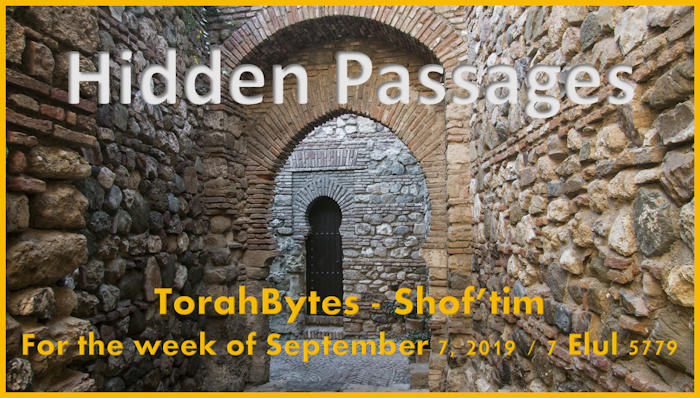For the week of September 7, 2019 / 7 Elul 5779
Shof’tim
Torah: D’varim/Deuteronomy 16:18 – 21:9
Haftarah: Isaiah 51:12 – 52:12
Download Audio [Right click link to download]
Who has believed what he has heard from us? And to whom has the arm of the LORD been revealed? (Isaiah 53:1)
Each week TorahBytes provides what is known in Hebrew as a D’var Torah, “a word from the Torah,” the term Torah used here to refer to the Five Books of Moses. My intent is to bring the inspired word of the ancient text to the hearts and minds of modern readers and listeners. The Torah is foundational to the entire Bible, providing the basis for God’s perspective on life and living. The schedule I follow is the same as used in synagogues around the world that publically reads through the Torah on an annual cycle. The weekly Torah reading is chanted during services each Monday, Thursday, and Shabbat (English: the Sabbath/Saturday). On Shabbat and festivals an additional reading is chanted, referred to as Haftarah. That Haftarah sounds similar to the word Torah is a coincidence; it actually means something along the lines of “to leave” to designate it as the concluding reading. Through the years as I have been providing TorahBytes, I have sometimes opted to comment on that week’s Haftarah.
The Haftarah readings are taken from the section of Hebrew Scripture called Nevi’im, meaning the Prophets. How the prophetic books are organized in the Hebrew tradition is different from the vast majority of English translations because the English follows the order from the Septuagint (the early Greek translation of the Hebrew Bible). Nevi’im has two subsections, the Former Prophets and the Latter Prophets. The Latter Prophets are almost the same in both the Hebrew and the Greek, while the Former Prophets are often known as historical books, and include Joshua, Judges, 1 & 2 Samuel, and 1 & 2 Kings. As for why these books are considered Nevi’im is likely due to how they lead to the emerging role of the prophet in the establishment of the Kingdom of Israel.
The Haftarah schedule is fixed with an excerpt from Nevi’im read alongside the same associated Torah reading every year. There are also set special Haftarah readings for various special occasions that preempt the normally associated one. How the tradition of Haftarah began, no one knows. There is a story told that it began at a time when Israel, under foreign oppression, was forbidden to read the Torah, and so other parts of Scripture were read instead, but that theory emerged over a thousand years afterwards, and there is no other evidence to support it.
Not only do we not know when such readings became adopted, we also don’t know the criteria for choosing which passages were to be read. It is pretty obvious, however, that passages were chosen on the basis that they contained elements that are reflective of the associated Torah portion.
Interestingly the earliest recorded account of synagogue readings from Nevi’im is found in the New Covenant Writings. In Luke chapter four, we see Yeshua given the scroll of Isaiah to read. Whether it was a set scheduled reading similar to what is done today or chosen by a synagogue official or Yeshua in the moment we don’t know. What we do know is that this passage, beginning with the words “The Spirit of the LORD is upon me,” which Yeshua applied to himself to inaugurate the messianic era, is not part of the Haftarah schedule today.
Some might be inclined to claim that the reading was purposely removed since it would be one of several readings from Nevi’im used by Yeshua’s followers to refer to him (e.g. see this article). The same is sometimes claimed for another passage from Isaiah, chapter 52:13 through 53:12, that speaks in graphic terms of the suffering and rejection of a righteous servant of God. The details appear to foretell with great precision exactly what happened to Yeshua and why. For example:
But he was pierced for our transgressions; he was crushed for our iniquities; upon him was the chastisement that brought us peace, and with his wounds we are healed. All we like sheep have gone astray; we have turned—every one—to his own way; and the LORD has laid on him the iniquity of us all. (Isaiah 53:5-6)
Contributing to the suspicion over the non-inclusion of this passage is that this week the Haftarah reading is Isaiah 51:12 – 52:12, while next week it’s Isaiah 54:1-10. This may give the impression that one of the most important and clearest predictive passages pointing to Yeshua being the Messiah was purposely skipped. The problem with this theory is that there is no evidence of an older list of Haftarah readings that include this or other passages, such as Isaiah 61 from which Yeshua read, that he fulfilled. What we do know is that whoever settled on the readings didn’t deem these passages sufficient for the purpose desired. There is no justification to assume any kind of conspiracy to keep this and other passages from the Jewish community.
In spite of whatever motive was behind the selection of Haftarah readings, it is tragic that the Suffering Servant passage and others that clearly point to Yeshua as Messiah are not more widely known. Yet to blame unknown ancients for what they didn’t list is misguided, especially since access to the whole Bible is available as never before. Not only can millions of people read the entire Bible in paper or digital form in their own language, those who know the truth of the messianic prophecies have it within their power to share these hitherto unknown truths with everyone around them, Jewish or Gentile. In this, the information age, virtually no one is prevented from encountering the truth – if we would only take the time to share it.
Scriptures taken from the English Standard Version
